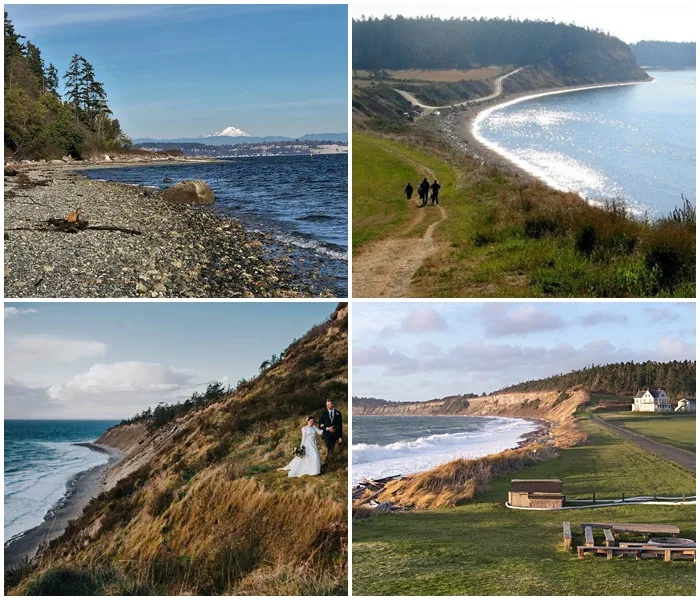Have you ever dreamed of a trip where each step not only uncovers scenic beauty but also touches the heart of nature? On Whidbey Island, a hidden gem nestled in Washington, that ecotourism dream becomes a reality. This place captivates visitors not only with its long stretches of coastline and turquoise waters but also with its rich biodiversity and close-to-nature experiences that are hard to find anywhere else. Join “Du lịch khắp thế gian” (Travel Around the World) to explore a unique ecotourism journey on Whidbey Island, where unspoiled beauty and conservation awareness intertwine, creating an ideal destination for nature-loving souls.
Whidbey Island: A Green Gem of Ecotourism
Whidbey Island, the largest island in Puget Sound, Washington, is more than just a typical tourist destination. It’s an ecological paradise where visitors can immerse themselves in pristine natural beauty and experience authentic sustainable tourism. With its vast area and diverse terrain, from majestic cliffs facing the Pacific Ocean to dense primeval forests and smooth white sand beaches, Whidbey Island offers a vibrant and colorful natural tapestry.
What sets Whidbey Island apart is its strong commitment to ecotourism. The local community and authorities are constantly striving to preserve the island’s natural beauty while creating opportunities for visitors to explore and experience it responsibly. This is evident in the maintenance of large natural parks, the promotion of environmentally friendly tourism activities, and the raising of environmental awareness for both residents and visitors.

Scenic unspoiled beach at Whidbey Island, an ecotourism destination in Washington State.
Discovering the Diverse Ecosystem at Deception Pass State Park
The heart of Whidbey Island’s ecotourism is Deception Pass State Park, one of the most famous national parks in the United States. This park encompasses the area around Deception Pass, the strait separating Whidbey Island and Fidalgo Island, offering an incredibly diverse and rich ecosystem.
Forest Ecosystem: Deception Pass State Park boasts old-growth forests with many rare tree species, creating an ideal habitat for numerous wildlife species. Visitors can hike on trails through the forest to explore its hidden beauty, admire ancient trees, and listen to the sounds of nature.
Marine Ecosystem: Deception Pass is where freshwater from rivers meets saltwater from the Pacific Ocean, creating a unique environment for many marine species. Visitors can explore the rich marine ecosystem by joining ecotourism boat tours, scuba diving, or kayaking.
Coastal Ecosystem: The coastline of Deception Pass State Park is diverse with sandy beaches, cliffs, and mangrove forests, home to many seabirds, mammals, and characteristic coastal plants. Visitors can stroll along the coast, birdwatch, observe wildlife, and learn about this unique coastal ecosystem.
Unique Ecotourism Experiences on Whidbey Island
When visiting Whidbey Island, tourists can participate in many exciting and meaningful ecotourism activities that help connect with nature and raise environmental awareness:
Hiking and Trekking: Whidbey Island has numerous hiking and trekking trails of varying difficulty, suitable for all types of visitors. From easy coastal trails to challenging cross-forest routes, visitors can freely explore the island’s natural beauty and improve their fitness. Some famous trails include:
- Deception Pass Bridge Trails: Stunning coastal trails with views of Deception Pass and the famous Deception Pass Bridge.
- Ebey’s Landing National Historical Reserve: A national historical reserve with hiking trails through forests, meadows, and beaches, offering a diverse experience of landscape and history.
- South Whidbey State Park: A state park with old-growth forests and pristine beaches, ideal for hiking and camping in nature.
Wildlife Watching: Whidbey Island is home to many rare wildlife species, including seabirds, seals, whales, otters, and deer. Visitors can join wildlife watching tours by boat or on foot for a chance to see these animals in their natural habitat. Especially during migration season, Whidbey Island becomes an important stopover for many migratory birds, attracting bird lovers from around the world.
Kayaking and Water Sports: With its long coastline and clear blue waters, Whidbey Island is an ideal destination for water sports such as kayaking, surfing, diving, and swimming. Kayaking is a great way to explore the beauty of the coastline, get closer to marine animals, and enjoy the tranquility of nature.
Visiting Local Farms and Vineyards: Whidbey Island is also famous for its organic farms and vineyards, where visitors can learn about sustainable agriculture processes, enjoy fresh produce, and shop for local souvenirs. This is a great opportunity to experience local agricultural culture and support environmentally friendly producers.
Responsible Ecotourism on Whidbey Island
To make your ecotourism trip to Whidbey Island more meaningful and sustainable, let’s join hands in practicing the following responsible tourism actions:
- Respect Nature: Do not litter, avoid making loud noises, do not damage plants, and do not disturb wildlife.
- Use Public Transportation or Bicycles: Limit the use of personal vehicles to reduce emissions and protect the air environment.
- Choose Eco-friendly Accommodation and Tourism Services: Prioritize hotels, guesthouses, and restaurants with green certifications or that implement environmental protection measures.
- Buy Local Products and Support the Community: Purchase local handicrafts, agricultural products, and use services from local businesses to contribute to community economic development and preserve local culture.
- Learn About Local Culture and History: Respect the customs and culture of local people, learn about the history and heritage of Whidbey Island to gain a deeper understanding of the destination.
Conclusion
Whidbey Island is not only a beautiful island with charming beaches but also an ideal ecotourism destination where visitors can immerse themselves in unspoiled nature, experience sustainable tourism activities, and raise environmental awareness. Come to Whidbey Island to discover its unique natural beauty, enjoy peace and relaxation, and contribute to preserving this green gem for future generations. A trip to Whidbey Island will surely be a memorable and meaningful ecotourism experience in your journey of exploring the world.